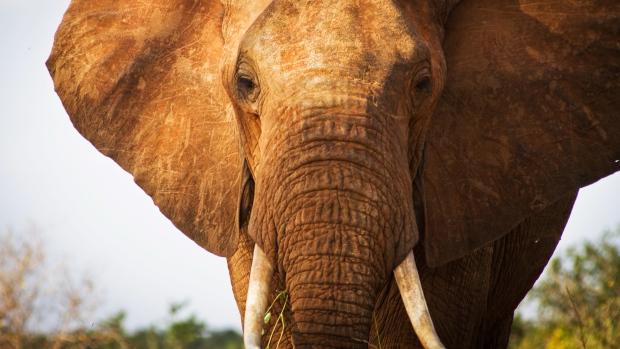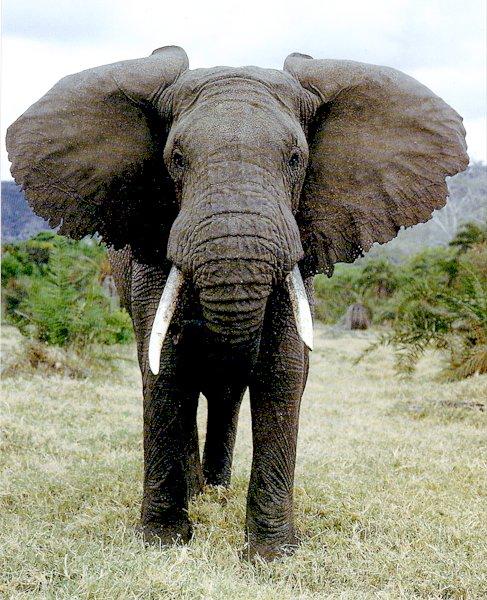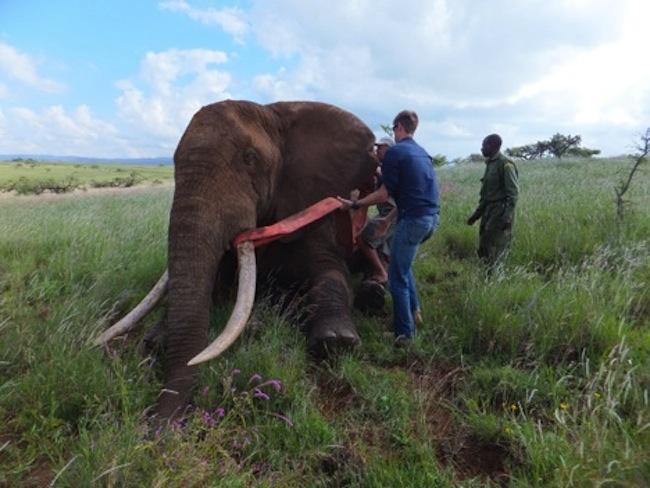CBC News @CBCNews
Why elephant poaching is still rampant
http://cbc.sh/4Ek0y3L
pic.twitter.com/v4loAFgb3s


 African Elephant herd at water hole, Kruger National Park
African Elephant herd at water hole, Kruger National Park

Africa's elephants are in more trouble than we thought.
THE AFRICAN ELEPHANT POPULATION WAS DECLINING BY 2% TO 3% PER YEAR
The illegal poaching of elephants for their ivory tusks has soared dramatically in recent years, with some100,000 African elephants killed between 2010 and 2012, according to new estimates published in theProceedings of the National Academies of Sciences.
During that period, researchers calculate that poachers were killing elephants much faster than new elephants were being born, and the overall population was likely declining between 2 percent to 3 percent per year.
If that pace were to continue, African elephants will eventually go extinct — and early estimates suggest the pace of poaching has stayed unsustainable through 2013.
Up until now, numbers on elephant poaching were fairly speculative. This new paper, led by George Wittemyer of Colorado State University, is the most detailed picture yet.
The researchers combined intensive study of wild populations in the Samburu region of Kenya with carcass data collected across the continent to make more precise estimates.
Demand in China is driving a rise in poaching
/cdn3.vox-cdn.com/uploads/chorus_asset/file/663566/175724989.0.jpg) Ivory tusks seized by Hong Kong customs officials are displayed during a press conference on August 7, 2013 in Hong Kong. (Lam Yik Fei/Getty Images)
Ivory tusks seized by Hong Kong customs officials are displayed during a press conference on August 7, 2013 in Hong Kong. (Lam Yik Fei/Getty Images)
Among other things, the paper confirms that there was a massive surge in African elephant kills starting in 2008 or so.
A KILOGRAM OF IVORY CAN NOW FETCH UP TO $7,000 IN CHINA
Why the jump? Rising demand from China likely plays a major role.
A kilogram of ivory can now fetch as much as $7,000
in China, where it's used for ornaments or ground up for use in traditional medicine.
The researchers found that the 2009 surge in illegal killings directly correlated with a jump in black-market ivory prices as well as a surge in seized trafficked ivory shipments destined for China.
That also happened to be the first year that China's legal internal ivory markets began booming.
What's more, elephant deaths in Africa seem to correlate with key variables for Chinese household consumption.
"[This] suggests reduction of demand for illegal ivory in China should be a priority," the researchers conclude.
The study also implies that some previous interventions may prove promising. For instance, 2011 was the worst year for elephant poaching — with some 40,000 elephants killed, or roughly 8 percent of the population.
But, at the end of the year, China cracked down on domestic ivory auctions, and poaching declined the following year. That doesn't prove the crackdown worked, but it's certainly suggestive.
What about other measures?
At the end of 2013, various countries in Africa and Asia attended an elephant conservation summit in Botswana, in which they committed to 14 "urgent measures" — from increasing penalties against ivory poaching and trafficking, to boosting wildlife protection agencies, to raising awareness about the importance of elephants.
(The United States, for its part, has been publicly destroying confiscated ivory shipments, although some economists have argued that this is counterproductive by raising prices.) We still don't know for sure if any of these measures are having an impact this year.
Some countries are better at conservation than others
(Wittemyer et al, 2014)
The researchers note that conservation efforts and enforcement are also critical to protecting Africa's elephants. And as the map above shows, that varies from country to country.
Namibia, for instance, has invested a fair amount in elephant conservation and protection programs (aided by a tourism boom) — and wild populations are growing there. By contrast, elephant populations are declining sharply in places like the Democratic Republic of Congo.
"It is obvious that stemming the rate of illegal killing is paramount," the researchers conclude.
"Heavy in situ conservation efforts have been shown to stem illegal harvesting and, therefore, need to be enhanced in the face of the current [poaching] rates. …
[C]urbing demand — particularly in the Far East — appears necessary to reduce black market ivory prices and alleviate the unsustainable pressure from illegal killing on wild populations."
Further reading: A Wikileaks-style website could help cut down on poaching.
Source: http://www.cbc.ca/news/technology/google-elephant-system-made-by-b-c-man-helps-fight-poaching-1.2709745
pic.twitter.com/v4loAFgb3s


 African Elephant herd at water hole, Kruger National Park
African Elephant herd at water hole, Kruger National Park
ELEPHANTS: Google earth enabled GPS collars helps fight poaching @ste_kenya http://www.cbc.ca/1.2709745
pic.twitter.com/pdESJRXRjSAfrica's elephants are in more trouble than we thought.
THE AFRICAN ELEPHANT POPULATION WAS DECLINING BY 2% TO 3% PER YEAR
The illegal poaching of elephants for their ivory tusks has soared dramatically in recent years, with some100,000 African elephants killed between 2010 and 2012, according to new estimates published in theProceedings of the National Academies of Sciences.
During that period, researchers calculate that poachers were killing elephants much faster than new elephants were being born, and the overall population was likely declining between 2 percent to 3 percent per year.
If that pace were to continue, African elephants will eventually go extinct — and early estimates suggest the pace of poaching has stayed unsustainable through 2013.
Up until now, numbers on elephant poaching were fairly speculative. This new paper, led by George Wittemyer of Colorado State University, is the most detailed picture yet.
The researchers combined intensive study of wild populations in the Samburu region of Kenya with carcass data collected across the continent to make more precise estimates.
Demand in China is driving a rise in poaching
/cdn3.vox-cdn.com/uploads/chorus_asset/file/663566/175724989.0.jpg)
Among other things, the paper confirms that there was a massive surge in African elephant kills starting in 2008 or so.
A KILOGRAM OF IVORY CAN NOW FETCH UP TO $7,000 IN CHINA
Why the jump? Rising demand from China likely plays a major role.
A kilogram of ivory can now fetch as much as $7,000
in China, where it's used for ornaments or ground up for use in traditional medicine.
The researchers found that the 2009 surge in illegal killings directly correlated with a jump in black-market ivory prices as well as a surge in seized trafficked ivory shipments destined for China.
That also happened to be the first year that China's legal internal ivory markets began booming.
What's more, elephant deaths in Africa seem to correlate with key variables for Chinese household consumption.
"[This] suggests reduction of demand for illegal ivory in China should be a priority," the researchers conclude.
The study also implies that some previous interventions may prove promising. For instance, 2011 was the worst year for elephant poaching — with some 40,000 elephants killed, or roughly 8 percent of the population.
But, at the end of the year, China cracked down on domestic ivory auctions, and poaching declined the following year. That doesn't prove the crackdown worked, but it's certainly suggestive.
What about other measures?
At the end of 2013, various countries in Africa and Asia attended an elephant conservation summit in Botswana, in which they committed to 14 "urgent measures" — from increasing penalties against ivory poaching and trafficking, to boosting wildlife protection agencies, to raising awareness about the importance of elephants.
(The United States, for its part, has been publicly destroying confiscated ivory shipments, although some economists have argued that this is counterproductive by raising prices.) We still don't know for sure if any of these measures are having an impact this year.
Some countries are better at conservation than others
The map below shows where Africa's elephant population is growing (in green) and shrinking (in yellow and red). The forest elephants of Central Africa have seen the biggest decline:/cdn1.vox-cdn.com/uploads/chorus_asset/file/663496/elephant_population_in_africa.0.png)
/cdn1.vox-cdn.com/uploads/chorus_asset/file/663496/elephant_population_in_africa.0.png)
(Wittemyer et al, 2014)
The researchers note that conservation efforts and enforcement are also critical to protecting Africa's elephants. And as the map above shows, that varies from country to country.
Namibia, for instance, has invested a fair amount in elephant conservation and protection programs (aided by a tourism boom) — and wild populations are growing there. By contrast, elephant populations are declining sharply in places like the Democratic Republic of Congo.
"It is obvious that stemming the rate of illegal killing is paramount," the researchers conclude.
"Heavy in situ conservation efforts have been shown to stem illegal harvesting and, therefore, need to be enhanced in the face of the current [poaching] rates. …
[C]urbing demand — particularly in the Far East — appears necessary to reduce black market ivory prices and alleviate the unsustainable pressure from illegal killing on wild populations."
Further reading: A Wikileaks-style website could help cut down on poaching.
Source: http://www.cbc.ca/news/technology/google-elephant-system-made-by-b-c-man-helps-fight-poaching-1.2709745

No comments:
Post a Comment